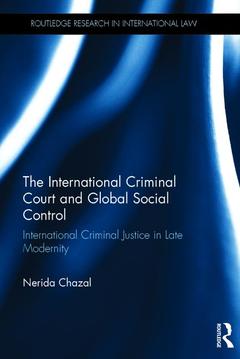The International Criminal Court and Global Social Control International Criminal Justice in Late Modernity Routledge Research in International Law Series
Auteur : Chazal Nerida

The International Criminal Court was established in 2002 to prosecute war crimes, crimes against humanity, and genocide. At its genesis the ICC was expected to help prevent atrocities from arising or escalating by ending the impunity of leaders and administering punishment for the commission of international crimes. More than a decade later, the ICC?s ability to achieve these broad aims has been questioned, as the ICC has reached only two guilty verdicts. In addition, some of the world?s major powers, including the United States, Russia and China, are not members of the ICC. These issues underscore a gap between the ideals of prevention and deterrence and the reality of the ICC?s functioning.
This book explores the gaps, schisms, and contradictions that are increasingly defining the International Criminal Court, moving beyond existing legal, international relations, and political accounts of the ICC to analyse the Court from a criminological standpoint. By exploring the way different actors engage with the ICC and viewing the Court through the framework of late modernity, the book considers how gaps between rhetoric and reality arise in the work of the ICC. Contrary to much existing research, the book examines how such gaps and tensions can be productive as they enable the Court to navigate a complex, international environment driven by geopolitics.
The International Criminal Court and Global Social Control will be of interest to academics, researchers, and advanced practitioners in international law, international relations, criminology, and political science. It will also be of use in upper-level undergraduate and postgraduate courses related to international criminal justice and globalization.
1. Introduction 2. The Development and Aims of the International Criminal Court 3. Tensions between Ideal and Reality in the Pursuit of Justice 4. Late Modernity, Social Control and the ICC 5. The Role of Actors in Shaping the ICC 6. The Trial as a Site of Contest: The DRC and Thomas Lubanga 7. The ICC as a Tool 8. Conclusion: The Resilience of the ICC and International Criminal Justice in Late Modernity
Nerida Chazal is a Lecturer in Criminology at Flinders University, Australia. Her research examines the aims and functioning of international criminal justice in a complex and increasingly global world. Nerida has previously worked as a Research Fellow with the Centre for Crime Policy and Research at Flinders University. She is co-editor (with W. De Lint and M. Marmo) of Criminal Justice in International Society (Routledge, 2014), and co-author (with M. Marmo) of Transnational Crime and Criminal Justice (Sage, 2016).
Date de parution : 11-2015
15.6x23.4 cm
Disponible chez l'éditeur (délai d'approvisionnement : 14 jours).
Prix indicatif 172,36 €
Ajouter au panierDate de parution : 06-2018
15.6x23.4 cm
Disponible chez l'éditeur (délai d'approvisionnement : 14 jours).
Prix indicatif 53,83 €
Ajouter au panierThèmes de The International Criminal Court and Global Social Control :
Mots-clés :
war crimes; crimes against humanity; genocide; ICC; atrocities; impunity; deterrence; international criminal justice; pursuit of justice; late modernity; DRC; Thomas Lubanga; international institution; ICC’s Aim; ICC’s Involvement; NGO Document; Differential Construction; ICC’s Reliance; ICC 2012b; International Criminal Court; ICC 2012a; ICC Prosecutor; End Impunity; ICC Trial; Central African Republic; CICC; Rome Statute; Contemporary Society; Lubanga Trial; Trial Chamber; HRW 2003b; Lubanga Case; ICC Case; NATO Airstrike; Rome Statute Preamble; Bosco Ntaganda



